Home security cameras are one of the most effective ways to keep your home and family safe. But with all the technology that goes into these devices, it’s natural to wonder, “Do home security cameras use alot of electricity?
The answer is no; home security cameras typically don’t use a lot of electricity. In fact, most models are designed to be energy-efficient, making them an affordable option for monitoring your home.
In this article, we’ll explain why home security cameras don’t use a lot of electricity and provide some tips to help you save energy while using your security system.
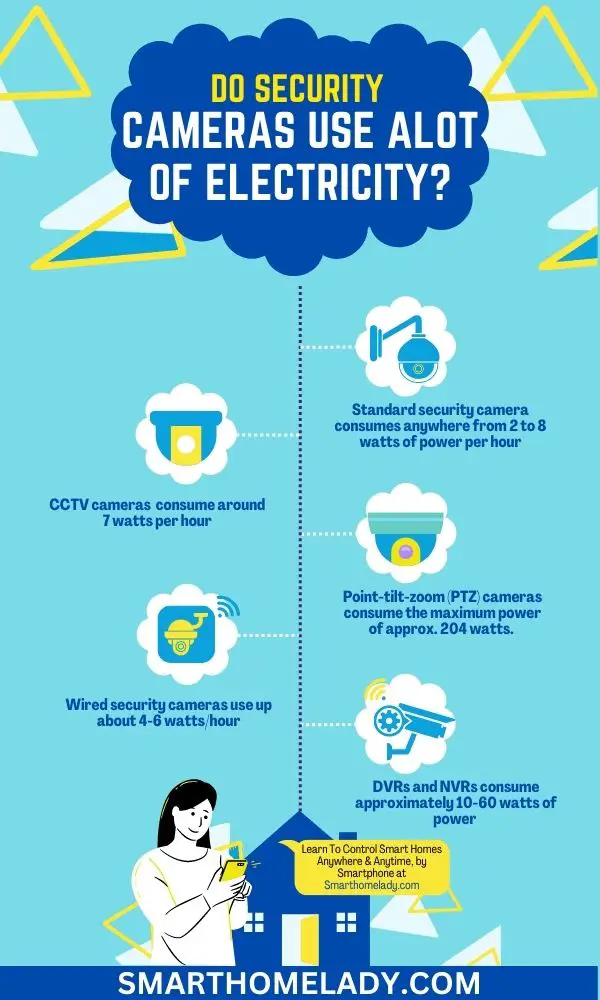
Contents
- 1 Do Home Security Cameras Use A Lot Of Electricity – Logical Explanation
- 2 Why Home Security Cameras Don’t Use A Lot of Electricity
- 3 How much power does a home security camera use?
- 4 Do Security Cameras Increase Electric Bill?
- 5 How To Reduce Cost Running CCTV/IP Home Security Cameras/Systems – 5 Ways
- 6 Tips To Save Energy While Using a Home Security System
- 7 Does A CCTV Camera Consume More Electricity?
- 8 How Much Electricity Does DVR Use?
- 9 How Many Watts Does A Hikvision Camera Use?
- 10 How Much Power Does A CP Plus CCTV Camera Use?
- 11 How Many Watts Do Your Security Cameras Use?
- 12 Conclusion
Do Home Security Cameras Use A Lot Of Electricity – Logical Explanation
No, home security cameras don’t use a lot of electricity. On average, a standard security camera consumes anywhere from 2 to 8 watts of power per hour. This translates to around 17 to 70 kWh per year, which is equivalent to the power consumed by a 60-watt incandescent bulb.
However, it is important to note that power consumption also depends on how often the camera is being used, the type of security, and the length of the recorded footage.
The majority of CCTV cameras consume around 7 watts per hour, which is equivalent to roughly 2 kWh of electricity annually.
Although DVRs and NVRs consume slightly more power than CCTV and PoE cameras, they still consume relatively low amounts of power, ranging from 10 to 60 watts depending on the features and model.
Security cameras may not be the most energy-consuming gadgets out there, but they do require a small amount of power to function.
Luckily, modern cameras only consume a watt or two of electricity, which costs mere cents each year.
So, if you’re worried about your energy bill skyrocketing, you can rest assured that your security cameras won’t be the culprit.
Of course, if you have multiple cameras or if you’re not careful when choosing or maintaining them, the power consumption can add up. But overall, security cameras are a relatively low-energy device compared to others, like computers or toasters.
Additionally, many home security systems have motion sensors that can trigger the cameras to only record when there is motion, thereby reducing the amount of electricity used.
Furthermore, most home security cameras are designed to be energy efficient, which helps to minimize the amount of electricity they use.
Homeowners can also opt for eco-friendly options such as solar-powered security cameras, which consume zero electricity from the grid.
These cameras use solar panels to charge their batteries, making them an excellent choice for those looking for a sustainable and cost-effective security solution.
Why Home Security Cameras Don’t Use A Lot of Electricity
So, why don’t home security cameras use a lot of electricity? The primary reason is that most cameras are designed to be energy-efficient. They use low-power LEDs, and their processors are engineered to be energy-efficient.
Most cameras are powered by a low-voltage DC source, such as a 12-volt transformer. This type of power source is designed to provide the camera with enough power to operate while consuming relatively little electricity.
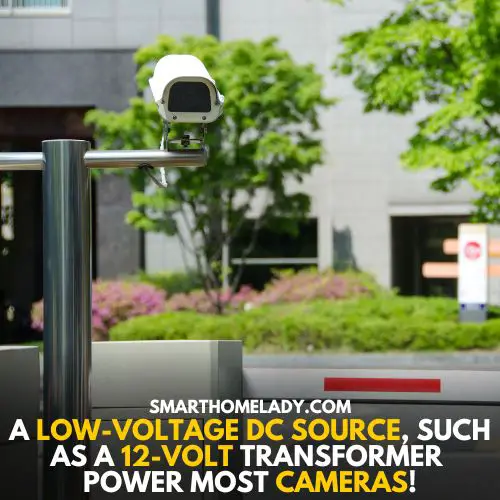
Additionally, most cameras are designed to operate in low-light conditions, which means they don’t need to use as much power to produce a clear image.
Do You Know! The camera’s low power consumption also helps to extend its battery life.
Some more advanced home security cameras are even solar-powered, meaning they require no electricity to operate. Solar-powered cameras are an excellent choice for those looking to minimize their electricity bill.
Additionally, some home security cameras are equipped with motion sensors, which only activate the camera when movement is detected. This type of technology helps to reduce electricity consumption and battery drain further.
How much power does a home security camera use?
The amount of power a home security camera uses depends on the size of the camera and the features it has. Generally, a basic home security camera will use between 4 and 5 watts of power, and a storage device takes almost 35 watts.
However, cameras with additional features such as motion sensors, night vision, and Wi-Fi connectivity can use up to 10 watts of power.
For instance, Point-tilt-zoom (PTZ) are the cameras that consume the maximum power of approx. 204 watts. But, this consumption is still lower than other electrical appliances.
Wired cameras typically use more power than wireless cameras because they need to be connected to a power source. Wired cameras usually consume around 4 or 6 watts of power.
Wireless cameras typically use less power than wired cameras due to battery-powered and motion detection ability.
Cameras with DVRs and NVRs will use more power than CCTV cameras. They consume approximately 10-60 watts of power, but this consumption is still lower as compared to other electrical appliances.
Point: Doubling the number of Security Cameras will add up to your electricity bill.
Features That Enhance Power Consumption
The type of security camera that you choose will also have an impact on its power consumption. For example,
- Cameras that come with motion sensors and infrared night-vision capabilities can use more power than basic models.
- Cameras with digital zoom capabilities and higher frame rates may require more power than cameras with standard features.
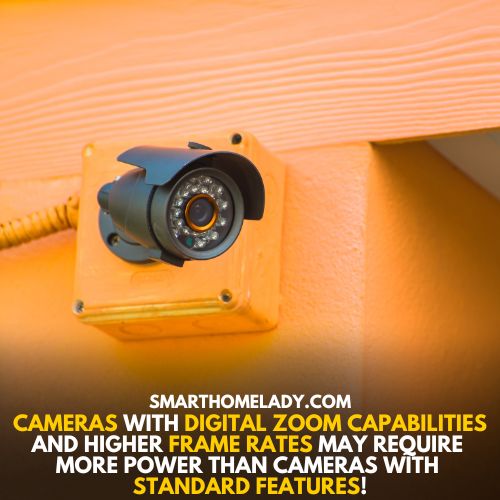
- Additionally, if your security camera is connected to a monitoring service, you may use more power if the system is constantly streaming video data.
To reduce the power usage of your security camera, make sure to turn it off when it is not in use. Also, ensure that the camera is placed in well-lit areas to reduce the need for night vision and motion sensors.
Do Security Cameras Increase Electric Bill?
Security cameras do consume electricity, but the increase in your electric bill will depend on a few key factors. The type of camera you choose, the features it offers, and how often it is used can all impact your monthly energy costs.
For example, a standard analog CCTV camera typically uses around 2-5 watts of power per hour. This means that if you have four cameras running 24/7, your monthly energy consumption could increase by around $20-$30.
On the other hand, if you opt for a more advanced IP camera with features like motion detection and night vision, the power consumption will be higher. These cameras can use anywhere from 5-20 watts of power per hour, which could add an additional $50-$100 to your monthly electric bill if you have multiple cameras.
Well, on average, wired security cameras use up about 4-6 watts/hour. So, in a day, that’s around 16 to 24 watts or roughly 480 to 720 watts in a month.
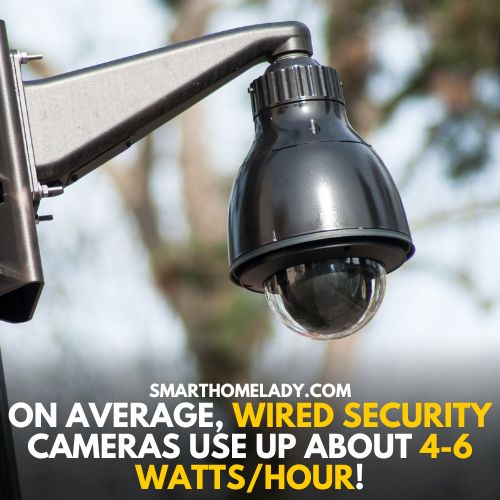
That’s a decent chunk of power, but it’s important to keep your security cameras running for safety reasons. Just make sure to factor in the electricity costs when budgeting for your home security system.
It’s worth noting that newer cameras are generally more energy-efficient than older models. Additionally, many cameras now come with options to reduce power consumption, such as scheduling when they turn on and off or adjusting the video quality to reduce data usage.
Things That Can Increase Your Electric Bill
- Some security cameras require more electricity if they are running in HD quality or require additional lights to be on at all times.
- Also, the more cameras that are installed, the more power is required to run the system. Depending on the number of cameras installed, the electric bill could easily double or triple.
- Furthermore, some security cameras require a hardwired connection, which can also increase the electric bill. This is because the hardwired connection will require more electricity than a wireless connection.
- Additionally, a lot of security cameras require a battery backup system, which can also add to the electric bill.
Overall, security cameras can increase an electric bill, but the amount of increase will depend on the type, number, and quality of cameras used.
If one is considering installing a security camera system, it is important to consider the potential electric bill increase so that one can plan accordingly.
How To Reduce Cost Running CCTV/IP Home Security Cameras/Systems – 5 Ways
If you’re looking to enhance the security of your home, installing CCTV/IP cameras is a great option. These cameras can help you keep an eye on your property, deter criminals and provide peace of mind.
However, the cost of running these cameras can quickly add up. Here are some tips to help you reduce the cost of running CCTV/IP home security cameras/systems.
- Use energy-efficient cameras: One of the easiest ways to reduce the cost of running CCTV/IP cameras is to use energy-efficient cameras. These cameras use less power than traditional cameras, which can help you save money on your energy bills.
- Choose the right storage option: Another way to reduce the cost of running CCTV/IP cameras is to choose the right storage option. Cloud storage can be expensive, so consider using a hard drive or memory card to store your footage instead.
- Use motion-activated recording: Motion-activated recording is another great way to save money on your CCTV/IP camera system. This feature will only record when it detects motion, which means you won’t have to store hours of footage of an empty room.
- Invest in quality cameras: While it may be tempting to go for the cheapest cameras available, investing in quality cameras can actually save you money in the long run. High-quality cameras are more durable and reliable, which means you won’t have to replace them as often.
- Cut down on false alarms: False alarms can be a major drain on your CCTV/IP camera system. To reduce the number of false alarms, make sure your cameras are properly positioned and set up, and consider using motion detection software.
By following these tips, you can reduce the cost of running your CCTV/IP home security cameras/system without sacrificing the safety and security of your home.
Tips To Save Energy While Using a Home Security System
Following are some tips that may help you to save energy while using a security system:
1. Use Motion-Activated Lights
Motion-activated lights are a great way to save energy while using a security system. By using motion-activated lights, you can save energy by only lighting up the area when it is necessary. This will also alert you to any potential intruders.
It can be set to turn on only when motion is detected and can be programmed to turn off after a certain amount of time. This will ensure that intruders do not have the opportunity to linger in the area undetected.
2. Utilize Low-Voltage Systems
Low-voltage systems are a great way to reduce energy consumption while still providing an effective security system.
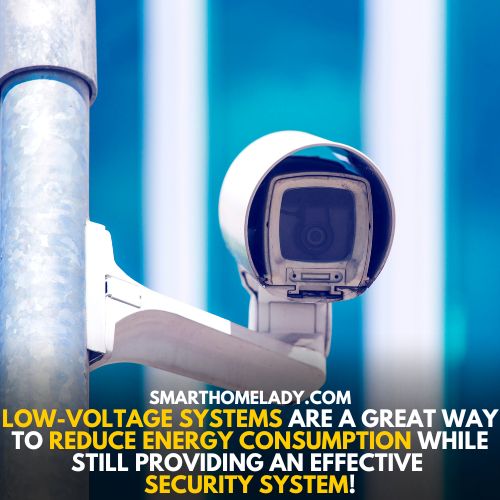
It uses less electricity than traditional security systems, which can help you save money on your energy bill. Low-voltage systems are also safer than traditional systems, as they can reduce the risk of electric shock and fire hazards.
Additionally, they are more reliable than traditional systems, as they don’t require as much maintenance or repairs.
3. Install a Solar-Powered Security System
Solar-powered security systems are a great way to save energy while providing security. These lights are powered by the sun, so they don’t require any electricity from your home. This will help you save on energy costs while still providing security.
With the lights powered by the sun, you don’t need to worry about wiring and extension cords. These lights are also great for areas with frequent power outages, as they will still remain on even if the power goes out.
4. Install Smart Security Devices
Smart security devices are designed to communicate with each other and can be controlled remotely. This will help you save energy by only using the devices when they are needed.
Smart security devices can also be used to monitor and detect changes in the environment. These devices can be used to monitor the energy usage of your home, allowing you to make more informed decisions about how much energy you are using.
5. Utilize Timers
By setting a timer, you can ensure that your security system is only activated when it is necessary. This will help you save energy by only using the system when it is needed.
Timers are also great for setting up a schedule for when your security system is active.
For example, you could set a timer to turn on the system when you leave for work in the morning and turn it off when you return home in the evening. This will help you save energy by only using the system when it is necessary and not wasting energy when it is not in use.
6. Use Rechargeable Batteries
By using rechargeable batteries, you can save energy by only charging them when they are needed. This will help you save energy by only using the batteries when they are needed.
By using motion-activated lights, low-voltage systems, solar-powered security lights, smart security devices, timers, and rechargeable batteries, you can ensure that your security system is only using the energy necessary to keep you safe.
Not only will this help you save energy, but it can also help you save money on your energy bill.
Other Tips
- The most important thing to remember with home security cameras is to always make sure they are powered off when not in use. This will significantly reduce their energy consumption and help you save money in the long run.
- Additionally, you can also opt for motion-sensing cameras, which only turn on when they detect motion. This can help reduce the amount of electricity used while providing a good level of security.
- Lastly, you should consider investing in solar-powered cameras, if possible, as this will provide even more energy savings.
Frequently Asked Questions FAQs
Does A CCTV Camera Consume More Electricity?
No, CCTV cameras don’t consume more electricity. A standard CCTV security camera consumes power in the range of 4-15 watts.
This amount of power consumption is relatively low, especially when compared to other household appliances like air conditioners or refrigerators. In fact, most CCTV cameras are designed to be energy efficient and consume very minimal power.
To put things into perspective, a CCTV camera that consumes 15 watts of power when running 24/7 for a month will only consume around 10 kWh of electricity. This is equivalent to the power consumption of a 60-watt light bulb running for the same period.
How Much Electricity Does DVR Use?
The amount of electricity used by a DVR depends on the model and usage. Generally, a DVR will use between 10-60 watts of electricity when powered on.
However, the amount of electricity used while recording or streaming content may be significantly higher.
Power consumption for HD-DVR is estimated to be 11-26 watts, while for non-HD DVR, it is approx. 8 to 15 watts.
Additionally, some DVRs are designed to remain powered on in standby mode, which can use up to 10 watts of electricity.
Therefore, it is important to take into account the model of DVR and the amount of use when estimating the electricity consumption of a DVR.
How Many Watts Does A Hikvision Camera Use?
The amount of power a Hikvision camera uses depends on the camera model. Generally, most Hikvision cameras use between 4 and 40 watts of power. The exact wattage used by a Hikvision camera can be found in the camera’s datasheet.
However, typically Hikvision cameras consume 40 watts when working with maximum features.
Hikvision cameras come with several power-saving technologies, such as motion sensing and infrared (IR) cut-off filters that turn off the camera when it’s not in use.
These features help reduce the overall energy consumption and make the camera more energy efficient.
How Much Power Does A CP Plus CCTV Camera Use?
A CP Plus CCTV camera typically uses about 5W to 50W of power, but this can vary depending on the model. Higher-end models may consume more power, while lower-end models may consume less.
Additionally, power consumption can be affected by the camera’s settings, such as the resolution, frame rate, and other features.
Power consumption can also be affected by the type of camera, such as an infrared camera, which can consume more power than a standard camera.
How Many Watts Do Your Security Cameras Use?
The amount of watts used by security cameras varies depending on the type and size of the camera. Smaller indoor cameras can typically use as little as 3 watts of power, while larger outdoor cameras may use up to 4-15 watts.
The wattage of a camera also depends on the features and functions of the camera, such as night vision and motion detection.
Conclusion
In conclusion, security cameras do consume some electricity, but not as much as you might think. With advancements in technology, many cameras are designed to be energy-efficient and cost-effective.
To minimize power consumption, you can opt for cameras with low power consumption or use solar-powered cameras. Additionally, you can use motion-activated cameras to reduce the time they are on and save energy.
Investing in security cameras is a smart choice that can help protect your property and loved ones without putting a significant strain on your electricity bill.
So, if you’re considering installing security cameras, do your research, choose wisely, and enjoy peace of mind knowing you’re keeping your home or business safe. Take action today and invest in a reliable security camera system.



Great post! It’s wonderful to see a clear breakdown of the electricity usage of home security cameras. Many people often hesitate to invest in these devices due to concerns about increased energy bills. Your article effectively dispels these fears by providing a detailed explanation of the low power consumption of modern security cameras. This information is invaluable for those looking to enhance their home security without compromising on energy efficiency. Keep up the informative content!
Thank You. I really appreciate your words.